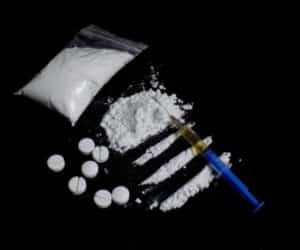Cocaine Addiction and Abuse

Learn how detox and rehab can help you win against cocaine addiction and abuse
Cocaine addiction and abuse is among the top ten most abused drugs in the U.S. and young adults aged 18 to 25 have the highest record of use. Illicitly used for recreational purposes, cocaine can be snorted, injected or smoked. Common street names for the drug are toot, coke, snow, blow, C and flake.
Cocaine floods the brain with the neurotransmitter dopamine, which causes a euphoric state and also blocks the perception of pain. It is a potent, highly addictive drug and those who abuse the drug can quickly build up a tolerance to it, requiring that the user take more of the drug to produce the same effects as before. When people first take cocaine they like the effects it produces, however, abuse and addiction reveal the misery and anguish that cocaine addicts experience.
Some of the signs of a coke addict include:
- Increased energy
- Talkativeness
- Shaking, tics and twitching
- Respiratory depression
- Hyperactivity
- Bizarre behavior
- Paranoia
- Hallucinations
- Hyperthermia
- Violent behavior
Cocaine can do irreversible damage to the brain and body that may result in hardening of the arteries, kidney damage, stroke, heart attack, psychiatric disorders and high blood pressure. Serious symptoms of a coke addict can include heart muscle damage, a ruptured aorta and Parkinson’s disease. The addict may develop mental disorders such as attention deficit hyperactivity disorder (ADHD) and other mental and behavioral changes. Cocaine addiction and abuse is often partnered with co-occurring mental disorders such as bi-polar disorder, chronic depression, anxiety disorder, post traumatic stress disorder (PTSD) and obsessive compulsive disorder (OCD).
There are many signs of a coke addict that reveal changes in his normal behavior patterns. The addict may become hyperactive and talk incessantly. He may have intense mood swings such as feeling happy and excited one minute and then feeling nervous, angry and paranoid the next minute. The addict can become suspicious of others and try to isolate himself for protection. His body may feel hot and the coke addict may twitch and shake. Sleeping and eating will be reduced to the bare minimum, and many addicts become malnourished and fatigued. When the effects of cocaine diminish in the body, the addict will experience intense cravings for the drug and may feel sad and exhausted. The addict may also suffer a severe decline in his over-all health and quality of life. Cocaine adversely affects the blood supply throughout the body, and the risk of stroke or brain damage can result from a lack of blood being supplied to the brain.
An addict can learn how to quit cocaine addiction when he joins a recovery program designed to help him accomplish that goal. Rehab center treatment programs offer safe, medically supervised detox programs. The patient is kept stable throughout the detox process and medications are administered to help ease the effects of withdrawal. Some of the withdrawal effects that the patient may experience are:
- Nausea
- Vomiting
- Diarrhea
- Muscle pain
- Spasms
- Sleep problems
- Intense cravings for cocaine
- Anxiety
- Fatigue
- Depression
Depending on the severity of the addiction, the patient can select an in or out-patient status, but should complete the full program to promote a successful recovery from addiction. After the detox is completed the patient will begin individual and group counseling, and behavioral and other therapies. Behavioral therapy is designed to help the patient discover the reasons or motivations that led him to abuse drugs. Identifying the reasons and their motivating factors is important because they will have to be dealt with and changed into positive, healthy thought patterns. This therapy is a vital part of how to quit cocaine addiction.
Contingency management is another important therapy in how to quit cocaine addiction. It offers rewards for good behavior and encourages the patient to forge ahead to stay on the right path of recovery. Sometimes medications are used that mimic cocaine, to lessen the chance of a relapse. The patient is slowly weaned off of these medications until he is virtually free of all drug addiction. Thus far, it is believed that behavioral and pharmacological treatments seem to be the most effective way of how to quit cocaine addiction.
If you or a loved one is struggling with cocaine addiction or abuse you can receive the proper recovery treatment by contacting a certified drug rehab center. Their drug specialists are qualified to assist you and teach you how to quit cocaine addiction for good.
If you or a loved one needs help with abuse and/or treatment, please call the WhiteSands Treatment at (877) 855-3470. Our addiction specialists can assess your recovery needs and help you get the addiction treatment that provides the best chance for your long-term recovery.
